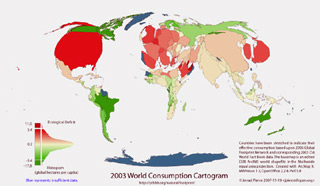
The area of each country has been distorted to represent its consumption, i.e. its ecological footprint. Countries which appear larger than normal are consuming more than their fair earth share and smaller countries are consuming less. (Image courtesy of Jerrad Pierce. Used with permission.)
Instructor(s)
Prof. John Sterman
Prof. Rebecca Henderson
Prof. Richard Locke
Sarah Slaughter
MIT Course Number
15.992
As Taught In
Spring 2008
Level
Graduate
Course Description
Course Features
Course Description
How can we translate real-world challenges into future business opportunities? How can individuals, organizations, and society learn and undergo change at the pace needed to stave off worsening problems? Today, organizations of all kinds—traditional manufacturing firms, those that extract resources, a huge variety of new start-ups, services, non-profits, and governmental organizations of all types, among many others—are tackling these very questions. For some, the massive challenges of moving towards sustainability offer real opportunities for new products and services, for reinventing old ones, or for solving problems in new ways. The course aims to provide participants with access and in-depth exposure to firms that are actively grappling with the sustainability-related issues through cases, readings and guest speakers.


